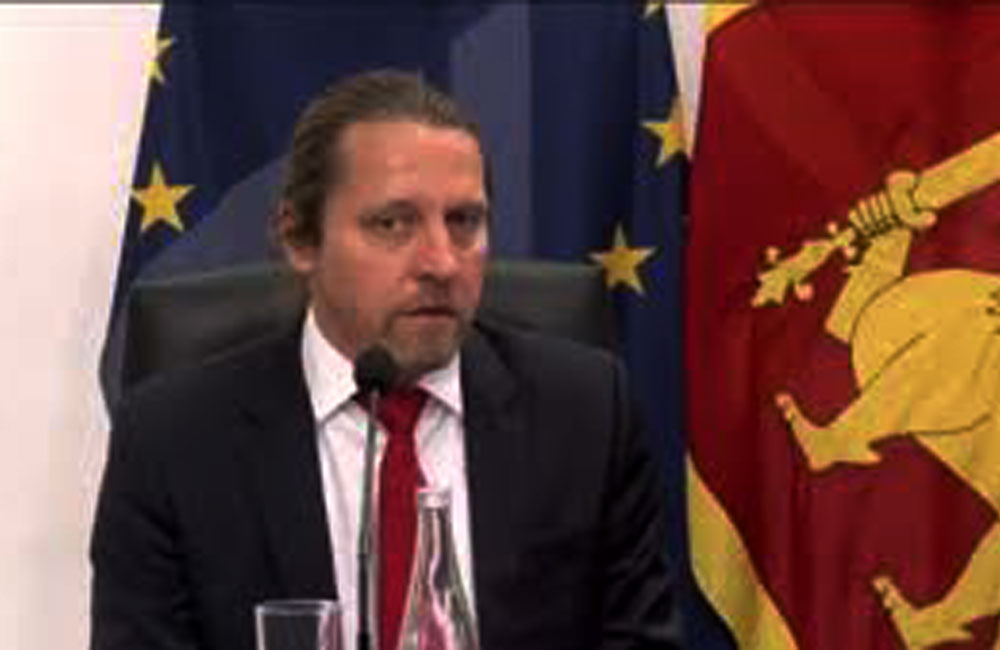The European Union says it has no problem with Sri Lanka’s large trade surplus with the region, a senior diplomat said. However, the EU noted its objections for the second time against rising protectionism and import controls, while highlighting the need for global trade to be open even amidst the COVID-19 pandemic.
This was revealed by Thorsten Bargfrede, Deputy Head of Mission at the Delegation of the European Union, at a forum in Colombo recently.
He was making a strong response to Sri Lanka’s Central Bank's aging Governor W. D. Lakshman’s political statement that the EU is over-reacting to the import controls.
It was unbecoming the Governor of a Central Bank to make such political remarks going beyond his responsibility and diplomatic protocol , a senior veteran CBSL official said.
In 2019, Sri Lanka exported USD 3.5 billion of goods to the EU (not counting EU tourists to Sri Lanka) which was 28.7% of total exports, and imported USD 1.68 billion of goods which was 8.9% of the total.
Sri Lanka slapped a series of import controls in April 2020 after money printing and a so-called ‘flexible exchange rate’ put pressure on the currency and earned a credit downgrade.
“From the EU view point, that we have a negative trade balance with Sri Lanka is not an issue as such,” he said adding that “failure of trade for us doesn’t come through a surplus (for Sri Lanka).
"The EU stands, as a principle, for a rule based open trading system, and does not believe in protectionism and especially in times of the COVID-19 crisis, global trade needs to stay open, not closed down,” he said, noting that the EU had remained open for Sri Lanka, with GSP plus preferential access so far.
Sri Lanka was set to lose GSP+ access when it was categorised as a middle income country, but as per capita gross domestic products fell after money printing triggered two currency crises in close succession in 2016 and 2018, the country was downgraded to a lower middle income status again.
In November, the EU warned Sri Lanka against import controls saying trade was not a one-way street.
“The current import restrictions are having a negative impact on Sri Lankan and European businesses, and on Foreign Direct Investment. Such measures impair Sri Lanka’s efforts to become a regional hub and negatively impact Sri Lankan exports by constraining the import of raw material and machinery. We recall that a prolonged import ban is not in line with World Trade Organisation (WTO) regulations,” the EU noted.
In Sri Lanka, there is a widespread mercantilist belief that imports (or a trade deficit, or a current account deficit) causes balance of payments problems and pressure on the currency and not money printing and credit.
The last administration banned gold imports after printing money in 2018 just as the credit system was recovering from an earlier crisis. The rupee collapsed immediately after gold imports were halted.
It also controlled imports after failing to restrain the central bank, which was following discretionary policy and printed money as the credit system recovered. Vehicles are also a perennial favourite for import control.
“The European Union looks at global problems – we have COVID now – as something that needs global solutions as well,” Bargfrede said.
"We believe we need to help ourselves, we need to work together to solve these issues. We feel for the Sri Lankan and for the global economy what we need are open and rules based trade so that businesses get confidence again to invest and re-start exchanges and to bring employment and revenues,” he added.
Bargfrede said the EU along with the UK and US accounted for about two thirds of Sri Lanka’s exports in recent years.
CBSL Governor W. D. Lakshman however, has suggested that the EU is over-reacting to the import controls.
Sri Lanka’s import controls run out in January 2021 but a pick-up in private credit has taken place over the past three months and money printing is still ongoing.

Leave your comments
Login to post a comment
Post comment as a guest